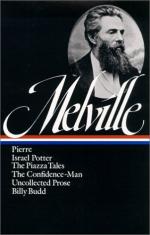Wrapped in a rich dressing-gown, a fanciful present from an admiring Marchesa, curiously embroidered with algebraic figures like a conjuror’s robe, and with a skull-cap of black satin on his hive of a head, the man of gravity was seated at a huge claw-footed old table, round as the zodiac. It was covered with printer papers, files of documents, rolls of manuscript, stray bits of strange models in wood and metal, odd-looking pamphlets in various languages, and all sorts of books, including many presentation-copies, embracing history, mechanics, diplomacy, agriculture, political economy, metaphysics, meteorology, and geometry. The walls had a necromantic look, hung round with barometers of different kinds, drawings of surprising inventions, wide maps of far countries in the New World, containing vast empty spaces in the middle, with the word desert diffusely printed there, so as to span five-and-twenty degrees of longitude with only two syllables,—which printed word, however, bore a vigorous pen-mark, in the Doctor’s hand, drawn straight through it, as if in summary repeal of it; crowded topographical and trigonometrical charts of various parts of Europe; with geometrical diagrams, and endless other surprising hangings and upholstery of science.
The chamber itself bore evident marks of antiquity. One part of the rough-finished wall was sadly cracked, and covered with dust, looked dim and dark. But the aged inmate, though wrinkled as well, looked neat and hale. Both wall and sage were compounded of like materials,—lime and dust; both, too, were old; but while the rude earth of the wall had no painted lustre to shed off all fadings and tarnish, and still keep fresh without, though with long eld its core decayed: the living lime and dust of the sage was frescoed with defensive bloom of his soul.
The weather was warm; like some old West India hogshead on the wharf, the whole chamber buzzed with flies. But the sapient inmate sat still and cool in the midst. Absorbed in some other world of his occupations and thoughts, these insects, like daily cark and care, did not seem one whit to annoy him. It was a goodly sight to see this serene, cool and ripe old philosopher, who by sharp inquisition of man in the street, and then long meditating upon him, surrounded by all those queer old implements, charts and books, had grown at last so wondrous wise. There he sat, quite motionless among those restless flies; and, with a sound like the low noon murmur of foliage in the woods, turning over the leaves of some ancient and tattered folio, with a binding dark and shaggy as the bark of any old oak. It seemed as if supernatural lore must needs pertain to this gravely, ruddy personage; at least far foresight, pleasant wit, and working wisdom. Old age seemed in no wise to have dulled him, but to have sharpened; just as old dinner-knives—so they be of good steel—wax keen, spear-pointed, and elastic as whale-bone with long usage. Yet




